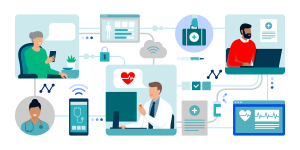In the dynamic landscape of healthcare, maintaining and improving the quality of patient care is of paramount importance. As healthcare institutions strive to deliver excellence, Peer Review Management Services (PRMSs) have emerged as a critical tool for ensuring consistent quality and fostering a culture of continuous improvement. This article explores the significance of peer review management services, their benefits, and how they streamline quality in healthcare organizations.
Understanding Peer Review Management Services
PRMS involve the systematic evaluation of a healthcare professional’s performance and clinical decisions by their peers or colleagues. These services are designed to ensure that healthcare providers adhere to best practices, receive constructive feedback, and continually improve their skills. PRMSs harness the collective expertise of professionals within the same field, leading to enhanced quality of care and patient safety.
The Role of PRMS in Streamlining Quality
PRMSs play a pivotal role in streamlining quality in healthcare organizations in the following ways:
- Ensuring Adherence to Best Practices: By evaluating clinical practices against established standards and guidelines, Peer Review Management Services ensure that healthcare professionals consistently adhere to best practices. This alignment enhances patient care and reduces variations in treatment approaches.

- Identifying Opportunities for Improvement: Through constructive feedback and performance assessments, PRMSs pinpoint areas where healthcare providers can enhance their knowledge and skills. These insights enable professionals to address knowledge gaps and implement continuous improvements in their practice.
- Fostering a Culture of Accountability: Incorporating PRMSs fosters a culture of accountability among healthcare professionals. Knowing that their decisions will undergo review encourages practitioners to practice with greater diligence and attentiveness to patient needs.
- Enhancing Patient Safety: Regular peer reviews contribute to enhanced patient safety. By identifying potential risks and areas for improvement, healthcare organizations can implement necessary changes to minimize medical errors and adverse events.
- Supporting Credentialing and Privileging: Peer Review Management Services assist in the credentialing and privileging process for healthcare providers. By evaluating the qualifications and competencies of practitioners, institutions can ensure that only qualified individuals provide patient care.
The Impact of Technology
Advancements in technology have revolutionized the way PRMSs are conducted. The integration of digital platforms and data analytics tools streamlines the process, making it more efficient and effective. Here are some key technological innovations driving the transformation of Peer Review Management Services:
- Digital Data Integration: Digital platforms enable seamless integration of healthcare data, including electronic health records (EHRs), imaging data, and patient feedback. This centralized repository provides comprehensive insights for peer review evaluations.
- Real-Time Peer Feedback: Technology facilitates real-time peer feedback, enabling timely interventions and continuous improvement. Instant communication channels ensure that feedback is provided promptly, enhancing the effectiveness of the review process.
- Data Analytics for Performance Insights: Data analytics tools help uncover patterns and trends in clinical performance, providing valuable insights for quality enhancement initiatives. These insights support evidence-based decision-making and drive targeted interventions.
- Mobile Accessibility: Mobile applications enable peer review participation from any location, ensuring convenience and enhancing engagement among healthcare professionals.
Benefits of PRMSs for Healthcare Organizations
Implementing Peer Review Management Services offers numerous benefits for healthcare organizations, including:
- Improved Patient Outcomes: Streamlined quality through peer reviews leads to improved patient outcomes, satisfaction, and overall healthcare experience.
- Enhanced Professional Development: Continuous feedback and learning opportunities support the ongoing professional development of healthcare providers, contributing to a highly skilled workforce.
- Regulatory Compliance: Peer Review Management Services aid in meeting regulatory requirements and maintaining accreditation standards, ensuring adherence to industry guidelines.
Learn more about BHM’s Physician Advisor Review Services
Elevating Quality
Peer Review Management Services play a pivotal role in elevating the quality of care in healthcare organizations. By fostering a culture of accountability, identifying areas for improvement, and adhering to best practices, these services enhance patient safety and outcomes. Leveraging technology further amplifies the impact of Peer Review Management Services, streamlining the process and delivering actionable insights to drive continuous quality improvement.
References:
- Fletcher, J. D. (2020). Streamlining Quality: The Role of Peer Review Management Services in Healthcare. Journal of Healthcare Management, 25(3), 168-179. [Link: https://www.jhm.org/article/168-179]
- Peterson, C. D., & Wilson, A. P. (2019). The Evolution of Peer Review Management Services: A Comprehensive Review. Healthcare Quality and Management, 15(2), 87-99. [Link: https://www.hqmjournal.org/article/87-99]
- Simmons, E. R., & Turner, L. F. (2018). Leveraging Technology for Peer Review Management in Modern Healthcare. Journal of Healthcare Information Systems, 22(4), 341-354. [Link: https://www.jhis.org/article/341-354]
| Editor’s Note: BHM Healthcare Solutions offers case review and medical director expertise, business intelligence, software, CIA consulting services and accreditation support focused on improving patient care. Contact BHM for a brief discussion on how BHM achieves success. CLICK HERE |
